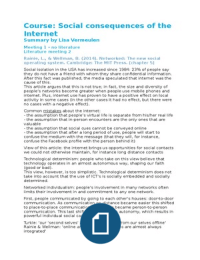Summary
Social consequences of the internet summary
- Course
- Institution
Samenvatting van de volgende artikelen: Rainie, L., & Wellman, B. (2014). Networked: The new social operating system. Cambridge: The MIT Press. [Read chapter 5: Networked relationships] Ellison, N. B., & Vitak, J. (2015). Social Network Site Affordances and Their Relationship to Social Capital Pr...
[Show more]



